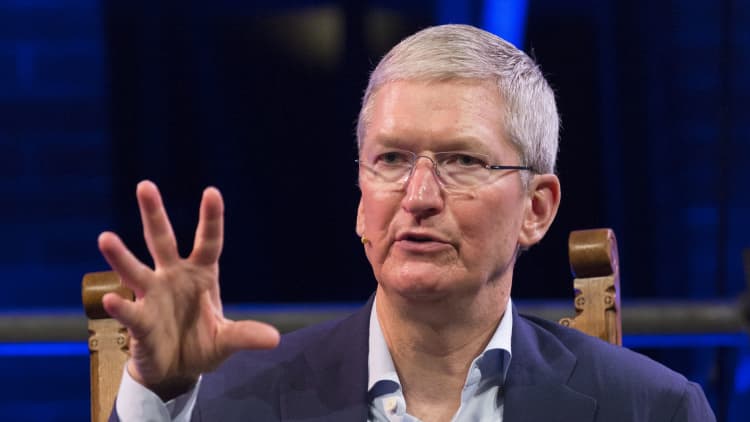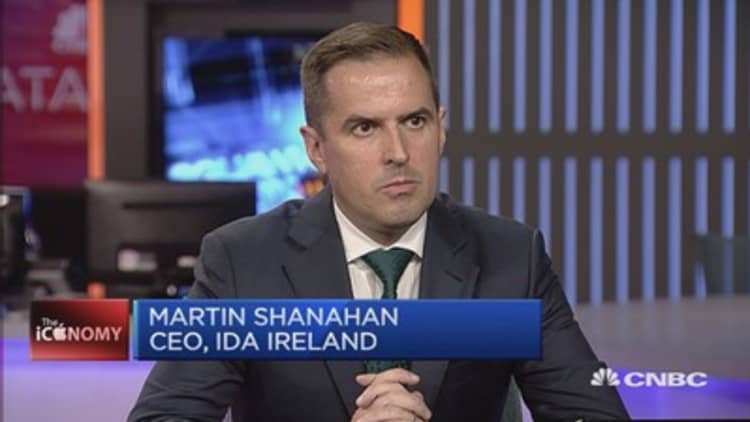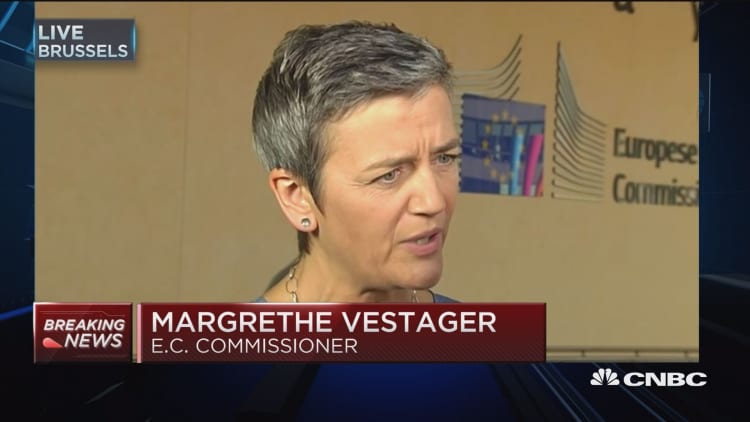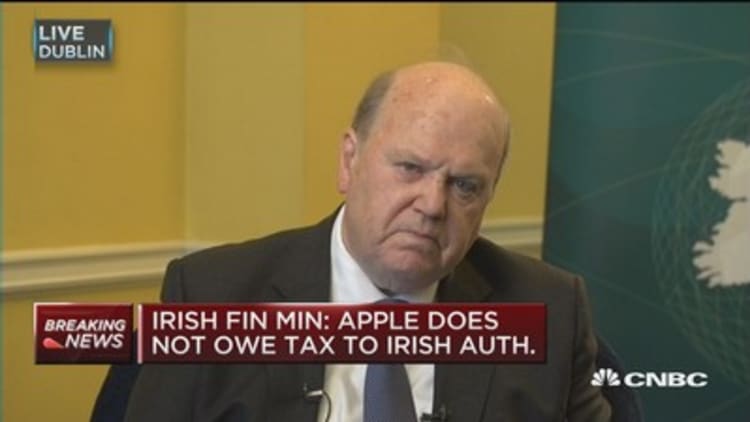



The European Commission's ruling that Ireland must claw back billions in unpaid taxes from U.S. tech giant Apple has caused shockwaves in the business world with questions now being asked over the future of multinationals in Europe, international taxation rules and even the economic partnership between the U.S. and Europe.
Both Ireland and Apple have said they will appeal the commission's ruling that the country must claw back 13 billion euros ($14.5 billion. But, the line between winners and losers from the deal is not immediately obvious or clear cut.
Irexit?
Despite Ireland being the obvious beneficiary of the commission's ruling – having been ordered to collect a haul of back taxes (plus interest) from Apple that could be used to clear its national debt – the country is not happy with the decision.
Ireland has seen a robust recovery after a euro zone bailout during the financial crisis and is the international base for other tech multinationals such as Google, Facebook and Twitter. As such, it fears that the ruling could put off other businesses from basing their operations in the country and could harm commerce.
Irish Finance Minister Michael Noonan stood by his country's taxation system and told CNBC that Ireland had not given Apple preferential treatment.
"The Irish Revenue don't do deals," he told CNBC. "They issue opinions to clarify a tax situation for individual companies but we never to deals," he said, arguing that the commission was trying to influence domestic tax policies through competition law.
UK jumps in
The ruling prompted some talk that Ireland could be tempted to follow the U.K.'s lead in leaving the European Union (EU) but that seems unlikely for now. The U.K. quickly expressed an interest in welcoming Apple to its shores following the ruling.
The U.K. Treasury issued a statement in which it said it would "welcome any company wishing to invest in Britain" although it added that "we have always been clear that companies that do business here must pay U.K. taxes."
Jobs at stake?
Apple wasted no time in condemning the commission's decision on Tuesday with its chief executive warning that it could have "serious, wide-reaching implications." Still, experts say that Apple won't be financially dented by the ruling.
CEO Tim Cook issued an open letter defending Apple's operations in Ireland, which he said had been ongoing since 1980. He added that Apple's base in Ireland had "helped create and sustain more than 1.5 million jobs across Europe — jobs at Apple, jobs for hundreds of thousands of creative app developers who thrive on the App Store, and jobs with manufacturers and other suppliers. Countless small and medium-size companies depend on Apple, and we are proud to support them."
Cook also warned that those jobs could be at risk in a region where unemployment is a bugbear for the recovering economy. "Beyond the obvious targeting of Apple, the most profound and harmful effect of this ruling will be on investment and job creation in Europe," he said.
U.S. Commerce Secretary Carlos Gutierrez told CNBC Tuesday that the decision could scare investors away from the EU. "The big problem here is not what it's going to do to Apple. Apple is going to survive this. It's what it does to the investment climate in the EU at a time when they desperately need investment," he said in an interview with CNBC's "Power Lunch."
Tax warfare
The ruling has also thrown up diverging opinions on issues of international taxation, fairness and integrity when it comes to multinationals. While Apple's Cook said that the commission was trying to undermine the sovereignty of EU member states, the EU's Competition Commissioner, Margrethe Vestager, who led the investigation into Apple, defended the ruling by saying that it wanted to create a "level playing field" for all businesses in the EU.
Richard Murphy, a U.K.-based taxation expert and professor of political economy, wrote in his blog Tuesday that the ruling was "a great day for the sovereignty of the EU's nations when it comes to tax."
"They will now be able to choose their own tax policies knowing another state should not be consciously undermining them when doing so. This might be the beginning of the end for tax competition in Europe, or tax warfare as it is better described (and) might herald the creation of what Europe has always wanted, which is a level playing field on which all businesses compete," he said.
"Anyone who believes in markets should be welcoming this morning's decision," he added, with smaller businesses particularly sanding to benefit from the ruling.
US not happy
Washington is also not happy with the commission's decision. A U.S. Treasury spokesperson told CNBC Tuesday that it was "disappointed" that it "is acting unilaterally and departing from the important progress the U.S., the EU, and the rest of the international community have made together to combat tax avoidance."
The Treasury also said that it thought the retroactive tax assessments were "unfair, contrary to well-established legal principles, and call into question the tax rules of individual member states." Crucially, it added that the ruling could "threaten … the important spirit of economic partnership between the U.S. and the EU."
The European Commission has already raised eyebrows in the U.S. by investigating other prominent U.S. firms, including Amazon and McDonald's. It has already targeted Starbucks (to whom it said the Netherlands had granted unlawful state aid) and Google, which is the subject of an ongoing EU antitrust investigation.
Lawyers laughing
Despite the U.S. criticizing the EU's decision, it is well aware that its own taxation rules have created an incentive for certain kinds of tax avoidance known as "inversions" - whereby firms have shifted their earnings to lower-tax countries in order to avoid higher U.S. taxes.
But Irish Finance Minister Noonan told CNBC that Ireland had not deliberately tried to attract U.S. companies for this reason and that the U.S. needed to sort out its own system.
"We don't invite U.S. companies to come to Ireland on the basis of inversion and we don't welcome them when they do, but under international law we cannot stop them … it is a matter for U.S. authorities to change the law," he said.
The U.S. announced earlier this year that it is looking to reform its taxation of international businesses, a move bound to keep corporate lawyers busy for some time. The commission's ruling was also likely to benefit the legal profession, with both Apple and Ireland set to contest the decision.
"The only certainty we know at this juncture is that there will be people getting rich off this: Lawyers," Neil Campling, senior vice president and head of global TMT research at Northern Trust Securities, told CNBC on Tuesday. "This will basically go through the courts for a number of years and there will be a number of legal issues that will come out of this," he said.


